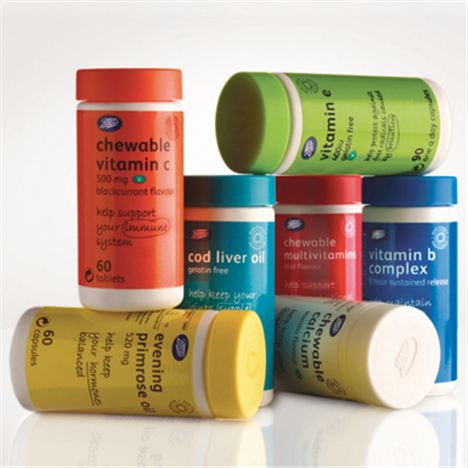THE change in seasons is upon us and as we slide into colder weather, marketing campaigns are urging us to protect ourselves against the seasonal onslaught of colds and flu by stocking up on vitamin supplements. But should we really be taking these and how on earth do we find a good one when the choice is so overwhelming?
Do we really need different vitamins at different times of year?
Possibly. For example, our exposure to sunlight in the winter months is practically non-existent so we won't be manufacturing any vitamin D ourselves. There tend to be more coughs and colds about so giving the immune system some extra support seems sensible and dry, chapped skin may benefit from some extra omega 3 and 6 essential fats.
How long will it take before I notice a difference?
It's important to remember that these are food supplements, not medicines and tend to work more slowly. Depending on the supplement, it may take a couple of months before you notice any difference but people often feel the benefits sooner, if it's the right one for them.
If I pay more, will I get a better supplement?
The short answer is probably, but watch out for marketing hype! You can end up paying more for a product just because it's well-advertised. Similarly, products that are very cheap or always on special offer most likely are because the companies that produce them can afford for them to be, ie. they are manufactured using low doses of vitamins made from cheap ingredients. It's important to understand that vitamins and minerals come in different chemical forms, some of which are more easily used in the body (bio-available) than others, for example, if someone is told they are anaemic, they are often prescribed iron sulphate, which is not well-absorbed by the body and often causes constipation. An alternative, such as iron fumarate, is absorbed much more easily and less likely to give the digestive side-effects.
Is it better to take individual vitamins or a comprehensive, A-Z supplement?
It depends on what you are trying to achieve. A good quality, broad spectrum multivitamin and mineral is useful for filling in the gaps that your diet may not be covering. B vitamins work together so should always be taken as a complex and the same is true for some minerals. Calcium, for example, should be taken with magnesium. However, some nutrients need to be taken at higher doses to get a beneficial effect and the amount that can be packed into just one or two tablets or capsules is limited. Vitamin C, for example, is usually taken in 500mg or 1000mg doses.
What do the RDAs mean and why do some supplements contain nutrients at more than 100% of the RDA?
When you look on the back of some supplement packaging, you may see figures for the percentage of the RDA for a particular nutrient the product contains. Sometimes the figures may be wildly in excess of 100% and some nutrients may have nothing in that column at all. The RDAs were originally designed as a means of determining what level of a particular nutrient people might need to avoid a deficiency disease such as scurvy or rickets. However, they are based on averages and tell us nothing about what an individual needs for his or her optimum health.
Can you overdose on vitamins?
Many, but not all, vitamins and minerals have a defined 'safe upper limit' above which adverse reactions have been reported. These are based on a total intake so include what you would get from food as well as supplements. If you follow manufacturers' recommended guidelines for taking supplements and avoid cocktails of several different multivitamins, you are unlikely to exceed these levels. However, it is worth getting expert advice if you are planning on taking several different supplements for any length of time.
Is it possible to be tested to see which vitamins you are lacking in?
There are tests available, for example, your doctor may check iron levels, vitamin D or calcium. I also work with private laboratory tests which can give you a more comprehensive overview of areas that may be lacking but these can be pricey.
What should I be looking for on the label?
Read the small print carefully - and sometimes it is really tiny! Avoid sugars, sweeteners and additives. Here for example is a list of ingredients for a popular, fizzy 'energy' supplement:
Citric Acid - acidity regulator; may cause allergic reactions in sensitive people
Sodium Hydrogen Carbonate - or baking soda - to make it fizzy; a source of sodium, too much of which may increase blood pressure.
Vitamin C
Magnesium Sulphate - a form of magnesium not well-absorbed by the body
Mannitol - sweetener; strongly linked to allergic reactions
Calcium Carbonate - Chalk!; a form of calcium not well-absorbed by the body
Magnesium Carbonate - a form of magnesium not well-absorbed by the body
Flavouring - unspecified; probably artificial
Sodium Carbonate - or washing soda - more fizz and more sodium (see above). May cause reactions at high doses.
Niacin - vitamin B3
Sweeteners (Acesulfame K, Aspartame) - artificial sweeteners; both associated with allergic reactions and worse.
Salt - more sodium (see above)
Zinc Citrate - well absorbed form of zinc
Colour (Beetroot Red, Beta Carotene) - natural food colouring
Pantothenic Acid - vitamin B5
Maltodextrin - another sweetener
Riboflavin - vitamin B2
Thiamin - vitamin B1
Acacia Gum - used as a thickener or emulsifier; may cause allergic reactions in sensitive people.
Vitamin B6
Partially Hydrogenated Soybean Oil - hydrogenated oils are industrially produced and are also known as 'trans fats' which have been associated with health issues such as heart disease and raised cholesterol and are banned in some countries.
Sugar - yet another sweetener!
Trisodium Citrate - more sodium (see above); may cause allergic reactions in some people.
Anti-Foaming Agent (Polysorbate 60) - industrially produced from sorbitol (a sweetener) and oils.
Folacin (Folic Acid)
Antioxidants (Alpha-Tocopherol, Sodium Ascorbate) - synthetic vitamins E & C; more sodium (see above)
Biotin - a B vitamin
Citric Acid - again! See above.
Vitamin B12
Surely you can get all the vitamins you need by just eating a healthy diet?
Unfortunately modern agricultural methods and the industrialisation of food means that most of us are not getting the vitamins and minerals we need, even when eating a 'healthy' diet. Add to that any extra requirements we have such as for a stressful lifestyle, exposure to toxins in the environment or the workplace, heavy caffeine or alcohol intake, smoking, exercise, pregnancy, etc and it's highly likely that we may be lacking in one or two areas, if not more.
However, to really help you make the right choice for you, as an individual, your best bet is to seek advice from a properly qualified nutritional therapist who has been trained to take a complete health history and put together a supplement programme for you personally. You can find a local practitioner via the website of the British Association for Applied Nutrition and Nutritional Therapy - BANT - www.bant.org.uk.
The advice given here is not intended to replace medical advice. Always consult your GP if you are concerned about your health.
Clare Jones, BA(Hons), Dip ION, mBANT NTC & CNHC registered
Nutritional Therapy 07985 166606.
If you would like to make an appointment for a personal nutrition consultation with Clare, please contact her on the above number or visit Clare’s website: www.clarejones-nutrition.co.uk
Follow Clare on Twitter @ClareJonesNutri and Facebook www.facebook.com/ClareJonesNutritionalTherapy













